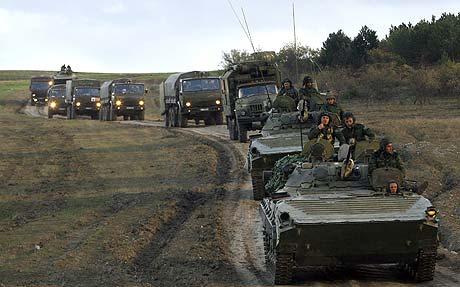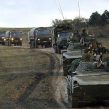
The Geneva Process: A Balance Sheet Since The Russia-Georgia War (Part Two)
Publication: Eurasia Daily Monitor Volume: 8 Issue: 48
By:

Two and a half years into the armistice and fifteen rounds into the Geneva implementation talks (“Georgia & The Geneva Process: A Balance Sheet Since The 2008 War,” EDM, March 10), the Geneva process seems to be leading nowhere.
The armistice agreements remain unimplemented in all respects save one, albeit a crucial one: Russian forces halted their further advance into Georgia. However, instead of withdrawing under the armistice terms to their pre-invasion positions, Russian forces remain forward-positioned in Abkhazia and South Ossetia, near the division lines they have drawn and are enforcing
across Georgia’s territory.
The European Union’s Monitoring Mission, stationed since October 2008 in Georgia’s interior (barred from the Russian-occupied territories), performs an interposition role. This civilian mission provides a political deterrent to Russian military mischief in Georgia (as had been seen in the lead-up to the August 2008 war). Its presence is rendered all the more necessary by the
failure of the Geneva process to obtain Russian compliance with the armistice terms. If Georgia is indeed far safer today compared to late 2008, according to its Foreign Affairs Minister, Grigol Vashadze (Radio Free Europe, March 7), this is primarily due to the EUMM.
Russia currently deploys several brigade-sized units in Abkhazia and South Ossetia, supplemented by 2,500 border troops in both sectors, a coastal guard flotilla in Abkhazia, and a still-growing network of military bases and compounds in both territories. During 2010, Russia added offensive firepower through Smerch multiple rocket launchers and Tochka-U mobile
ballistic missile systems. Their ranges cover much of Georgia’s territory while field artillery in Akhalgori has Tbilisi within its range. Russia has also deployed S-300 surface-to-air missile systems in Abkhazia, so positioned as to be able to interdict the air corridor over the Black Sea
and South Caucasus.
Apart from potential threats, Russian militarization of Abkhazia and South Ossetia is changing the population structure in these territories, to Russia’s long-term strategic advantage. Thousands of Russian military personnel and their dependents are settling in, many of them undoubtedly to
stay on in Abkhazia after retirement from service (a pattern familiar in the case of Moldova’s Transnistria and an added obstacle to conflict-resolution). As Russian military settlement proceeds in these territories, the ethnic cleansing of Georgians from the same territories
remains a fait accompli, which the Geneva process is failing to remedy.
The Geneva process operates through two groups, on security issues and on refugee-related issues, respectively. The two groups hold parallel meetings during the negotiating rounds involving Russia, Georgia, the EU, the US, the United Nations, OSCE, and the Abkhaz and South Ossetian authorities.
Discussions in the security group have had no bearing on the deployment and entrenchment of Russian forces in Abkhazia and South Ossetia. These actions have nullified the armistice agreement’s troop-withdrawal stipulations. In this situation, Georgia proposes a two-stage approach within the Geneva security group’s format: first, to agree on an international security
mechanism with a presence on the ground in Abkhazia and South Ossetia, and second, to work out a mechanism for military de-occupation within an appropriate political framework. The Russian side has continued to stonewall on both counts.
Russia wants the Georgian government to sign legally binding non-use of force agreements on a bilateral basis with Abkhazia and with South Ossetia (which Russia “recognizes” as states), respectively. Russia offers to “guarantee” the observance of such agreements, whether singly or as part of some international guaranteeing format. For a first step in that direction, Moscow proposes that Tbilisi, Sukhumi, and Tskhinvali should each undertake non-use-of-force commitments and “exchange” their respective statements with each other on a bilateral basis. Russia itself, however, refuses to undertake any such commitment. According to its Deputy Foreign Minister and chief representative to the Geneva process, Grigory Karasin,
Russia would not sign a non-use-of-force agreement with Georgia because it would imply that Russia is a party to the conflict. Moscow continues insisting that Abkhazia and South Ossetia, not Russia, are parties to the conflicts (Interfax, March 4, 7).
Moscow has taken this position ever since 1992 to evade responsibility for its own conflict with Georgia. Ten years later, Russia developed the proposal for Georgian-Abkhaz and Georgian-South Ossetian non-use-of-force agreements under Russian guarantees. Then as now, this proposal seeks to obtain Georgian and international recognition of the two secessionist territories, and empower Russia as a security arbiter (“guarantor”) for all parties.
Georgia proposes a non-use-of-force agreement to be worked out and signed by Russia and Georgia. Pending this, Georgia has made such a pledge unilaterally, and calls for Russia to make a similar pledge. In his November 23, 2010 speech to the European Parliament, President Mikheil Saakashvili committed Georgia to “never use force to restore its territorial integrity
and sovereignty, and only resort to peaceful means in its quest for de-occupation and reunification” (Civil Georgia, November 23, 2010). Tbilisi followed up with official letters undertaking that commitment to all major international organizations and all the Geneva process participants.
Moscow has not reciprocated; but, according to Karasin, it has inspired the Abkhaz and South Ossetian leaders, Sergei Bagapsh and Eduard Kokoiti, to issue unilateral declarations along similar lines (Interfax, March 7). This is consistent with Russia’s denial of responsibility as a party to the conflict and its attempts to equalize its two proxies with Georgia in the negotiating process.




